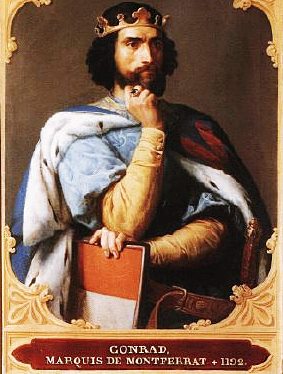
Defense of Costantinople |
year: 1187 |
| Defeat and Death of the rebel general Alexios Vranas | ★ ★ ★ ★ ★ |
|
enemy: (Civil War)
|
location: Constantinople
|
accuracy:
●●●●●
|
|
battle type: Pitched Battle |
war: Military Revolts |
modern country:
Turkey |
| ▼ The Byzantines(emperor: Isaac II Angelos) | ▼ The Enemies | |
| Commander: | Emperor Isaac II Angelos, Conrad of Montferrat | General Alexios Vranas |
| Forces: | ||
| Losses: |
| Background story: |
| Two years after defeating the Normans of Sicily at Mosynopolis and Dimitritsi, the Byzantine General Alexios Vranas, while in campaign against Vlach-Bulgarian rebels, rose in revolt against Emperor Isaac II Angelos and marched against the Byzantine capital. Vranas, a capable general associated with the Komnenian family, despised Isaac and believed that he could claim the throne himself. |
The Battle: |
 Conrad of Monferrat In the center was the new brother-in-law of the emperor Conrad of Montferrat (Corrado del Monferrato) with a force of Latin mercenaries consisting of 250 knights and 500 infantry. Vrana's army, although of numerical advantage, could not resist the attack of the Latins of the imperial army and began to retreat. In order to give courage to his warriors, Vranas threw himself into battle and personally attacked Corrado, but his spear only slightly wounded his opponent in the shoulder. Instead, Corrado’s lance struck the cheekpiece of Vranas’ helmet, pierced his cheek and threw him under the horse. There, on the ground, the bodyguards of Corrado hit Varnas with their spears. The injured Vranas begged for his life, but Corrado ordered his beheading. With their leader dead, the insurgent army left the battlefield. The soldiers of Isaac did not pursue them. The head of Vranas was taken to the imperial palace, where it was treated like a football, and was then sent to his wife Anna. |
Aftermath: |
| With the death of Vranas, Byzantium lost a capable general who could be useful in the horrible events of the following years. Conrad of Montferrat left for the Holy Land in 1187, because he feared the revenge of Vranas' family and also because the climate in Constantinople was not at all favorable for him being a “Latin” and a murderer of Vranas. In 1192 he briefly became King of Jerusalem. |
|
|
